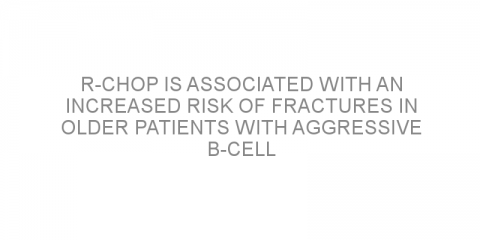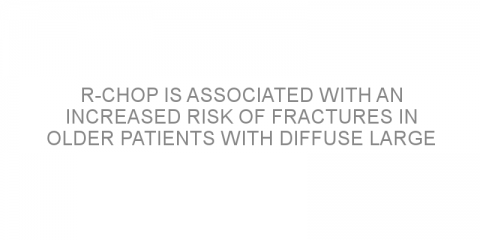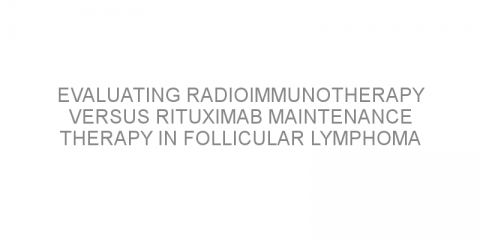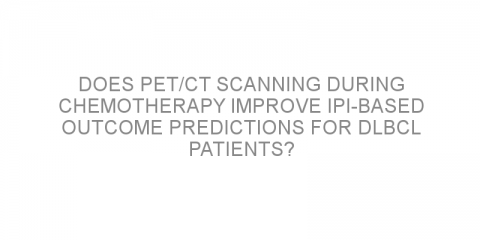In a nutshell This study investigated the occurrence of fractures and identified factors associated with a higher risk of fractures in patients with aggressive non-Hodgkin lymphoma (NHL) who received R-CHOP (rituximab, cyclophosphamide, doxorubicin, vincristine, and prednisolone)-like therapy. The data showed that there is a higher risk of...
Read MoreType(s) of chemotherapy-Protocols (combined treatment)-CHOP Posts on Medivizor
R-CHOP is associated with an increased risk of fractures in older patients with diffuse large B-cell lymphoma.
In a nutshell This study was carried out to assess the risk of fractures associated with R-CHOP (rituximab, cyclophosphamide, doxorubicin, vincristine, and prednisolone) for diffuse large B-cell lymphoma (DLBCL). The authors found that there was a high fracture risk in older patients receiving R-CHOP for the treatment of...
Read MoreVenetoclax treatment regimes in non-Hodgkin lymphoma
In a nutshell This study aimed to investigate the safety and effectiveness of two venetoclax (Venclexta) treatment regimes in non-Hodgkin lymphoma patients. This study concluded that one of these regimes was safe and showed effectiveness in these patients. The recommended dose of venetoclax was also found. Some background New therapies...
Read MoreComparing outcomes after adding two doses of rituximab to R-CHOP chemotherapy for aggressive B-cell lymphoma
In a nutshell This study investigated the safety and effectiveness of six versus eight doses of rituximab (Rituxan) in R-CHOP (rituximab, cyclophosphamide, doxorubicin, vincristine, prednisone) chemotherapy for patients with aggressive B-cell lymphoma. This study concluded that adding two extra doses of rituximab to R-CHOP had similar outcomes in these...
Read MoreDo ACE inhibitors help with anthracycline-induced cardiotoxicity in leukemia and lymphoma?
In a nutshell This study aimed to investigate if enalapril influences anthracycline-induced cardiotoxicity in children with leukemia and lymphoma. This study concluded that enalapril has a role in reducing anthracycline-induced cardiotoxicity in these patients. Some background Anthracyclines are a class of chemotherapy drugs that can be used for...
Read MoreEvaluating radioimmunotherapy versus rituximab maintenance therapy in follicular lymphoma
In a nutshell This study compared the outcomes of radioimmunotherapy versus rituximab (Rituxan) maintenance therapy in patients with follicular lymphoma (FL). This study concluded that radioimmunotherapy shows similar survival outcomes compared to rituximab maintenance therapy in patients with FL. Some background In patients with FL, rituximab...
Read MoreLong-term outcomes of radioimmunotherapy in patients with follicular lymphoma
In a nutshell This study investigated the long-term outcomes of radioimmunotherapy following first-line (primary) R-CHOP (rituximab, cyclophosphamide, doxorubicin, vincristine, prednisone) in previously untreated patients with advanced-stage follicular lymphoma (FL). This study concluded that this treatment approach is effective and well-tolerated in...
Read MoreEvaluating rituximab maintenance therapy for mantle cell lymphoma
In a nutshell This study investigated the effectiveness of rituximab (Rituxan) maintenance therapy (treatment that is meant to help a primary treatment succeed) in patients with mantle cell lymphoma. The study concluded that this therapy improved survival outcomes in these patients after stem cell transplantation. Some background Chemoimmunotherapy is...
Read MorePredicting outcomes for patients with DLBCL using the albumin to globulin ratio
In a nutshell This study evaluated the significance of the albumin to globulin ratio in pretreated patients with diffuse large B-cell lymphoma. The study concluded that this ratio was useful for predicting treatment outcomes in these patients. Some background R-CHOP (rituximab, cyclophosphamide, doxorubicin, vincristine, prednisone) is the most...
Read MoreComparing survival outcomes for elderly DLBCL patients receiving different first-line chemotherapies
In a nutshell This study investigated the effects of different chemotherapies on the survival outcomes of elderly patients with diffuse large B-cell lymphoma (DLBCL). This study concluded that R-CHOP treatment is associated with very good survival in elderly patients with DLBCL. Some background Diffuse large B-cell lymphoma (DLBCL) is the most common...
Read MoreWhat are the outcomes for B-cell lymphoma patients who receive salvage treatment for cancer that does not respond to R-CHOP chemotherapy?
In a nutshell This study compared the outcomes of different salvage treatments in patients with aggressive B-cell non-Hodgkin lymphoma with PET-positive disease (remaining cancer cells) after R-CHOP (rituximab, cyclophosphamide, doxorubicin, vincristine, prednisone) chemotherapy. This study concluded that B-cell NHL patients with PET-positive...
Read MoreDoes PET/CT scanning during chemotherapy improve IPI-based outcome predictions for DLBCL patients?
In a nutshell This study investigated whether interim FDG PET/CT scanning during chemotherapy helps predict risk for new DLBCL (diffuse large B-cell lymphoma) patients. This study concluded that this scanning improves the risk classifications used to predict outcomes for DLBCL patients. Some background Diffuse large B-cell lymphoma (DLBCL) is the most...
Read More










